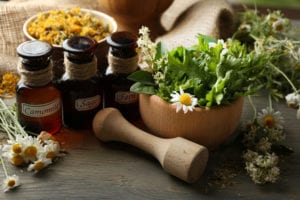Written by Joyce Smith, BS. Two days (20 minutes per day) of geranium oil aromatherapy significantly reduced anxiety levels in the forty participating patients with acute myocardial infarct compared to the placebo group who received primrose oil aromatherapy.
 Acute myocardial infarct (AMI), ranking among the most common types of coronary heart disease, can be life threatening, requiring immediate care and often leading to psychological problems including anxiety, fatigue, depression and sleep disruption. Anxiety stimulates the sympathetic nervous system which, in turn, affects vital signs such as respiratory rate, heart rate, blood pressure, and oxygen demand, all of which can be life-threatening to the patient with AMI.1
Acute myocardial infarct (AMI), ranking among the most common types of coronary heart disease, can be life threatening, requiring immediate care and often leading to psychological problems including anxiety, fatigue, depression and sleep disruption. Anxiety stimulates the sympathetic nervous system which, in turn, affects vital signs such as respiratory rate, heart rate, blood pressure, and oxygen demand, all of which can be life-threatening to the patient with AMI.1
The greatest moments of anxiety for AMI patients occurs during their first 48 hours in cardiac care units (CCU’s) 2; therefore, anxiety reduction through the use of complementary and alternative treatments that are free of pharmaceuticals and their side-effects is urgently needed 3. The inhalation of fragrant essential oils, known as aromatherapy, has been shown to reduce pain, stress, and depression 4. Geranium oil, an essential oil with antimicrobial and antifungal properties, may also reduce stress and, in addition, promote wound healing 5; yet no studies have focused on its ability to reduce anxiety among AMI patients. This study’s objective is to evaluate geranium’s effect on anxiety among AMI patients admitted to a CCU.
This 6 month randomized, triple-blind, placebo controlled clinical trial6 involved 80 patients, aged 18-60 years, who were diagnosed with AMI and admitted to CCU. They received on the 2nd and 3rd days of their CCU stay either pure geranium essential oil diluted with primrose 10 % to a concentration of 100% (n=40) or sunflower oil 12% (n=40).
Three drops of geranium oil and placebo oil were poured on absorbing patches that were attached inside the oxygen masks of the geranium and placebo groups respectively and inhaled for 20 minutes per day on two consecutive days (based on previous research) 7. Anxiety levels were measured using STAI (an introspective psychological inventory of 40 self-report items pertaining to anxiety) and was administered by a researcher 30 minutes before and 15 minutes following aromatherapy inhalation. A demographic questionnaire was used to obtain additional information.
Analysis showed that aromatherapy with Geranium essential oil significantly reduced anxiety levels at various time intervals over the course of the study (P<0.001). Baseline anxiety scores showed no significant difference between the two groups (P>0.05); however, compared to the placebo group, the geranium group showed significant reductions in anxiety scores after each aromatherapy session (P<0.001).
These results were in line with previous studies 6. Geranium aroma stimulates the olfactory system which causes the limbic system in the brain to exert its anti-anxiety and analgesic effects. Linalool, borneol, and terpineol present in geranium oil are active components that enhance its anti-anxiety effects8. Geranium essential oil, when used in aromatherapy is a safe, practical and inexpensive treatment for anxiety among AMI patients.
Aromatherapy was done over two days only in this study because AMI patients usually spend just a short time in CCUs before they are transferred to a post-coronary unit. This short duration along with emotional support from family and friends may have influenced study results. Needless to say, future studies are warranted to investigate other clinical benefits such as pain reduction, and improved sleep quality and vital signs.
Source: Shirzadegan R, Gholami M, Hasanvand S, Birjandi M, Beiranvand A, Effects of geranium aroma on anxiety among patients with acute myocardial infarction: A triple-blind randomized clinical trial, Complementary Therapies in Clinical Practice (2017), doi: 10.1016/j.ctcp.2017.10.005.
Click here to read the full text study.
Posted October 26, 2017.
Joyce Smith, BS, is a degreed laboratory technologist. She received her bachelor of arts with a major in Chemistry and a minor in Biology from the University of Saskatchewan and her internship through the University of Saskatchewan College of Medicine and the Royal University Hospital in Saskatoon, Saskatchewan. She currently resides in Bloomingdale, IL.
References:
- Bikmoradi A, Seifi Z, Poorolajal J, Araghchian M, Safiaryan R, Oshvandi K. Effect of inhalation aromatherapy with lavender essential oil on stress and vital signs in patients undergoing coronary artery bypass surgery: A single-blinded randomized clinical trial. Complementary therapies in medicine. 2015;23(3):331-338.
- Cho M-Y, Min ES, Hur M-H, Lee MS. Effects of aromatherapy on the anxiety, vital signs, and sleep quality of percutaneous coronary intervention patients in intensive care units. Evidence-Based Complementary and Alternative Medicine. 2013;2013.
- Fakari FR, Tabatabaeichehr M, Kamali H, Fakari FR, Naseri M. Effect of inhalation of aroma of geranium essence on anxiety and physiological parameters during first stage of labor in nulliparous women: a randomized clinical trial. Journal of caring sciences. 2015;4(2):135.
- Lua PL, Salihah N, Mazlan N. Effects of inhaled ginger aromatherapy on chemotherapy-induced nausea and vomiting and health-related quality of life in women with breast cancer. Complementary therapies in medicine. 2015;23(3):396-404.
- Shokri H, Khosravi A, Mansouri M, Ziglari T. Effects of Zataria multiflora and Geranium pelargonium essential oils on growth-inhibiting of some toxigenic fungi. Iranian Journal of Veterinary Research. 2011;12(3):247-251.
- Motahareh Sirousfard * MM, Mahim Moieni, Farangis Samooie, Mohamad Masoud Heidari. The effect of aromatherapy with Pelargonium graveolens on postoperative pain intensity in hospitalized children: A clinical randomized trial. Journal of Clinical Nursing and Midwifery. 2014;3(2):67-76.
- Najafi Z, Taghadosi M, Sharifi K, Farrokhian A, Tagharrobi Z. The effects of inhalation aromatherapy on anxiety in patients with myocardial infarction: a randomized clinical trial. Iranian Red Crescent Medical Journal. 2014;16(8).
- Ali B, Al-Wabel NA, Shams S, Ahamad A, Khan SA, Anwar F. Essential oils used in aromatherapy: A systemic review. Asian Pacific Journal of Tropical Biomedicine. 2015;5(8):601-611.
